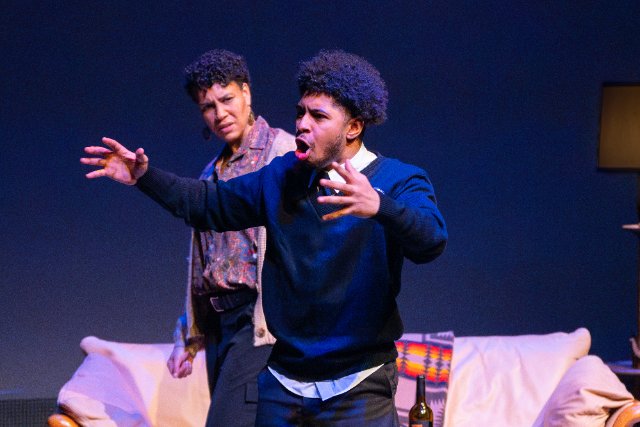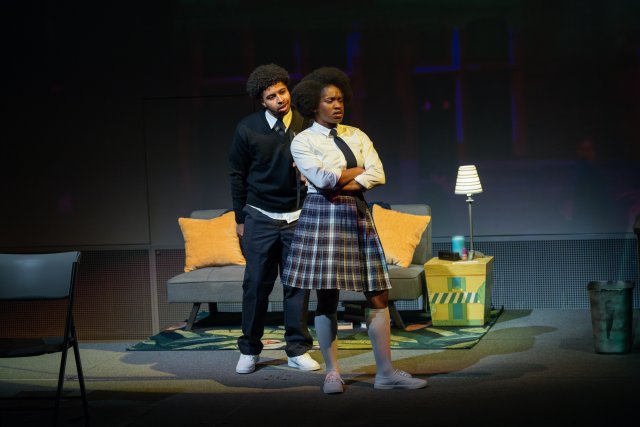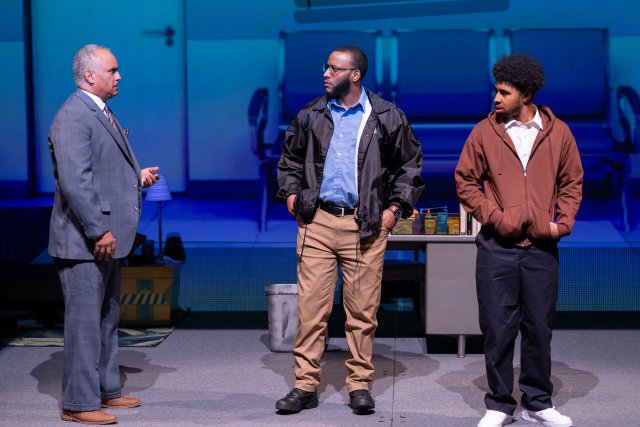Pipeline
The Dangers of Growing Up Black in America
By: Victor Cordell - Mar 18, 2024
Many events in the life of a mother can be distressing. Among the most is when her child’s very public actions come into conflict with the mother’s values and jeopardize the child's future…..
Dominique Morisseau has become one of the most distinguished playwrights of her generation. A MacArthur Fellowship (“Genius Grant”) winner, she made her mark with her Detroit Project trilogy, which focuses on the Black community in her Michigan hometown. She followed the last of those three plays with “Pipeline.” Like its predecessors, this play exudes insight and power. African-American Shakespeare’s L. Peter Callender-directed production totally enthralls as it extracts every bit of relevance and urgency from the taut and compelling script.
The title of the play derives from the tragic arc that many Black boys and young men follow. Numerous studies have established that Black children in schools are subjected to more disciplinary measures than Whites and that their punishment is more extreme. In the past, virtually all school conflicts were adjudicated by the school administration. In recent decades, administrators have often turned to the police to intervene. The consequence is that many Black males have been arrested and charged for behaviors in school before they have become men. The taint of arrests and missed classes impacts their ability or desire to complete school and their employability, leading to the school-to-prison pipeline.
Black, divorced, single parent Nya teaches in a high school that her son Omari would attend if he were to go to public school. Leontyne Mbele-Mbong is Nya, and she gives an exquisite, nuanced performance. As one would expect from an aspirational teacher who also acts as a role model, her rage is as controlled and disciplined as her arguments.
Her son, Omari (Atlantis Clay), is bright and able to compete intellectually in a selective private boarding school, but he suffers social/psychological isolation and has had some deportment problems. When we meet him, he is with his girlfriend Jasmine (Ije Success). The scene seems out of place until we find through Jasmine that the damning incident of Omari’s pushing a teacher has been video recorded and has been posted on the Internet.
As a mother, Nya’s instinct is to protect her only child. As a teacher, she feels strongly about civil rules that allow schools and all of society to function properly, even over Omari’s protestations that he was provoked by a biased teacher who made insinuating connections between Omari and the character Bigger from Richard Wright’s novel “Native Son.”
Nya’s ex, Xavier (Michael Gene Sullivan), is prosperous, and both parents are committed to giving their son all of the tools for success, including the private schooling. Nya’s ambivalence, humility, and problem-solving approach in dealing with a possibly life-altering incident is countered by her ex, Xavier. Morisseau delineates his character with unflattering precision.
Xavier’s power-based approach and certainty about the right courses of action is matched by the likelihood that his actions will have the opposite effect intended. We see in his relationship with Omari the classic responsible, but absentee, father. The checks and birthday presents are always on time, but he lacks a drop of human compassion, which may have led to the marital split as well. And when it comes to blame, Xavier lays it on anyone but himself.
A subplot acts as a cross current. In the classroom of a White teacher, Lauri (Kelly Rinehart), a violent fight takes place. According to the security officer Dun (Gary Moore), protocol suggests that a teacher should always stay clear of the fray and only call security. But when faced with a brutal struggle that could lead to serious injury or worse, should the teacher stand by or take action, and if so, what? The luxury of reflection does not exist.
In an intense 95 minutes, the playwright surfaces a number of universal relationship as well as racial issues. Parents often feel accountable about how their children have been reared, and Nya feels guilt about whatever failings Omari manifests. She also feels protective, knowing that as a young Black man, his mere presence and innocent actions can be perceived by Whites as too this or too that. And unlike Xavier, she is willing to make personal sacrifices for her son.
From the opening video projections of violence in schools involving police, this production offers a chilling reminder of our country’s failure to create social harmony and a fair playing field for all of our people. Unfortunately, the play provides no answers other than to suggest that there is much work to be done.
Fortunately, the production is graced with an ensemble of exceptional actors who bring veracity and passion to their roles. Giulio C. Perrone’s set design is appropriately simple and leaves it to the words of the playwright and the delivery of the actors to instill the meaning.
Interestingly, the highly regarded film “The Hate U Give” was developed contemporaneously to “Pipeline.” For those interested in different perspectives on similar issues, it covers some of the same concerns and is recommended as a companion piece. Both note how Whites can often misunderstand and miscommunicate with Blacks, sometimes insulting with or without intention. Each deals with the lifelong risks of simply being Black and the code of silence in not betraying one of their kind to authorities, despite adverse consequences. Finally, they deal with the cost that may be associated with taking responsibility, whether Black or White.
“Pipeline” written by Dominique Morisseau, is produced by African-American Shakespeare Company, and plays at War Memorial Veterans Building, 401 Van Ness Ave., San Francisco, CA through March 31, 2024.




